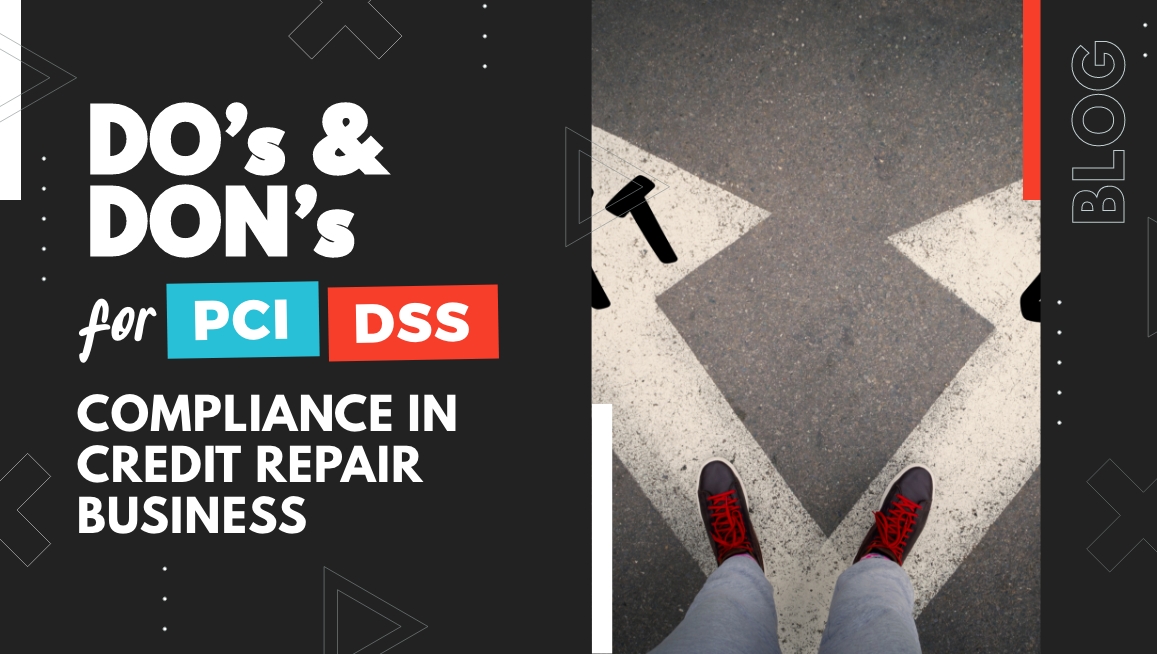Do’s & Don’ts for PCI DSS Compliance in Credit Repair Business
by Joshua Carmona
September 5, 2024
05:18 PM

Maintaining PCI DSS (Payment Card Industry Data Security Standard) compliance is a critical aspect of running a secure and trustworthy credit repair business. As credit repair businesses often handle sensitive personal and financial information—including confidential information such as account numbers, social security numbers, and other private data—ensuring the security of that data is not just a legal requirement but a trust issue. Non-compliance can lead to severe penalties, data breaches, and a tarnished reputation.
Data breaches can result in thousands or even millions of records exposed, including confidential client details.
In this detailed guide, we will explore the key do’s and don’ts for maintaining PCI DSS compliance specifically for credit repair businesses. We will cover sales, invoicing, and the role of credit repair business software. The content will also touch on credit repair laws and why ongoing education in the credit repair industry is essential.
What is PCI DSS Compliance?
PCI DSS compliance refers to a set of security standards designed to ensure that all companies that accept, process, store, or transmit credit card information maintain a secure environment. These standards were developed by the Payment Card Industry Security Standards Council to protect cardholder data against data breaches and fraud.
In the context of credit repair businesses, maintaining PCI DSS compliance is non-negotiable. Many credit repair companies accept payment via credit cards, making them subject to these regulations. Non-compliance with PCI DSS standards can result in heavy fines, penalties, and even legal action. More importantly, a data breach can ruin your company’s reputation, leading to the loss of clients and long-term business damage. Being identified as a breached company can also result in a significant loss of trust from customers and increased regulatory scrutiny.
Why PCI DSS Compliance and Identity Theft Prevention Matter for Credit Repair Businesses

As a credit repair business, handling sensitive financial data is part of your everyday operations. Financial institutions and credit agencies are also held to high standards for data protection, making compliance a shared responsibility across the industry. PCI DSS compliance ensures that this data is protected at every step—whether it’s in transit during a credit repair dispute process or while being stored in a credit repair CRM (Customer Relationship Management) system.
Compliance is not just about avoiding fines and penalties; it’s about building trust with your clients. Clients entrust your credit repair business with their personal information, and it’s your responsibility to ensure that this data is not compromised. Furthermore, many credit repair software solutions are built to help you achieve PCI DSS compliance, but it’s still vital to understand the standards and best practices to ensure full compliance.
Understanding Credit Reporting in the Context of PCI DSS
Credit reporting is at the heart of the credit repair industry, and understanding its connection to PCI DSS is essential for protecting both your business and your clients. Credit reporting agencies—such as Equifax, Experian, and TransUnion—collect and maintain vast amounts of consumer data, including credit history, payment records, and personally identifiable information. This data is highly valuable to identity thieves and is often targeted in data breaches.
PCI DSS compliance sets the standard for how companies that handle payment information must secure their systems and processes. For credit repair businesses, adhering to these standards is not just about protecting payment data—it’s about safeguarding all consumer data involved in credit reporting. Implementing robust security measures, such as two-factor authentication and strong encryption, helps prevent unauthorized access and reduces the risk of credit fraud and fraudulent transactions.
By prioritizing PCI DSS compliance, credit repair businesses and credit reporting agencies can better protect consumers from identity theft and data breaches. This not only helps maintain the integrity of the credit reporting process but also builds trust with clients who rely on your services to manage and repair their credit. In today’s environment, where data breaches can have far-reaching consequences, a proactive approach to compliance is essential for any company handling sensitive credit information.
Do’s for Maintaining PCI DSS Compliance in Your Credit Repair Business
Ensuring PCI DSS compliance is a proactive, ongoing process that involves implementing a series of best practices to safeguard sensitive cardholder data. Below are essential steps— “do’s”— that every credit repair business should follow to maintain compliance.
- Do: Use PCI DSS-Compliant Payment Processors
One of the simplest and most effective ways to maintain PCI DSS compliance is by using a PCI-compliant payment processor. These processors are designed to handle most of the security requirements for storing, processing, and transmitting cardholder data, thus minimizing the compliance burden on your credit repair business. Choosing a reputable service ensures ongoing compliance and support.
Using a compliant payment processor can help you:
- Automate security protocols: Many PCI-compliant payment processors have built-in security measures like encryption, tokenization, and fraud detection.
- Ensure compliance updates: As PCI DSS standards evolve, compliant processors update their systems accordingly, so you don’t have to worry about falling out of compliance.
- Reduce liability: A PCI DSS-compliant processor helps reduce your liability in case of a data breach.
How to Choose the Right Payment Processor
When selecting a payment processor for your credit repair business, ensure they meet PCI DSS compliance requirements. Request proof of PCI DSS compliance and security certifications from potential providers before making a decision. Look for providers that offer:
- Encryption and tokenization services.
- Real-time fraud monitoring.
- Data breach insurance as part of their package.
- Do: Encrypt Transmission of Cardholder Data
Encryption is a critical component of PCI DSS compliance. All sensitive cardholder data must be encrypted during transmission over open or public networks. This ensures that even if data is intercepted, it cannot be read or used without the encryption key.
For your credit repair business, you should use encryption protocols like TLS (Transport Layer Security) to secure all communications that involve sensitive financial data. Additionally, ensure that your credit repair business software supports these encryption standards.
Why Encryption is Important in Credit Repair
Since many credit repair processes involve disputes, billing, and client communication, the transmission of sensitive data is frequent. This includes:
- Credit card details during payments.
- Account number associated with client accounts or disputes.
- Client information shared during credit repair disputes.
- Sensitive financial documents transmitted between your business and credit bureaus.
Encrypting this data ensures that even if a cybercriminal intercepts the transmission, they won’t be able to access the data without the correct decryption key.
- Do: Limit Cardholder Data Storage
PCI DSS standards clearly state that cardholder data should only be stored when absolutely necessary, and when it is, it must be encrypted. Furthermore, sensitive authentication data, such as CVV numbers and PINs, must never be stored after authorization, as it violates PCI DSS regulations.
For credit repair businesses, this means storing only the minimal amount of cardholder information required for business operations. Reducing data storage not only helps with compliance but also minimizes risk in the event of a data breach.
Best Practices for Limiting Data Storage
- Store only truncated or masked card numbers: Display only the last four digits of the credit card number.
- Encrypt all stored data: Ensure that any cardholder data stored within your credit repair CRM is encrypted.
- Automate data deletion: Use tools within your credit repair business software to automatically delete stored data after a specific date or retention period to ensure compliance.
- Do: Regularly Monitor and Test Systems
One of the most important elements of PCI DSS compliance is ongoing system monitoring and testing. It’s not enough to set up secure systems; you need to regularly test and audit them to ensure they remain secure.
Credit repair businesses should implement logging and monitoring systems that track access to cardholder data. Regular vulnerability scans, penetration testing, and software updates are essential to staying compliant and preventing breaches.
How Monitoring Enhances Compliance
Monitoring and testing your systems help ensure:
- Immediate detection of suspicious and unexpected activity.
- Quick response to potential security threats.
- A documented trail in case of audits or investigations.
- Do: Secure Access to Cardholder Data
PCI DSS compliance requires that access to cardholder data is restricted to only those employees who need it to perform their job functions. This involves implementing strong access control measures, such as multi-factor authentication (MFA), to ensure only authorized personnel can access sensitive data.
In your credit repair business, it’s vital to:
- Implement role-based access control (RBAC) to limit data access based on employee roles.
- Use MFA for any systems that handle cardholder data.
- Regularly review access logs to ensure compliance.
Protecting Credit Files: Safeguarding Sensitive Information

Safeguarding credit files is a fundamental responsibility for both credit reporting agencies and consumers. With identity theft and credit fraud on the rise, protecting sensitive information—such as social security numbers, addresses, and account details—has never been more important. Credit reporting agencies must implement advanced security protocols to ensure that only authorized individuals can access credit files, reducing the risk of unauthorized use and new accounts being fraudulently opened.
One of the most effective tools for protecting credit files is a credit freeze. By placing a credit freeze, consumers can restrict access to their credit reports, making it much harder for identity thieves to use stolen data to open new credit accounts. This simple step can be a powerful deterrent against identity fraud.
Consumers should also take an active role in protecting their credit identity. Regularly reviewing credit reports for suspicious activity, using password managers to create and store strong, unique passwords, and avoiding the reuse of passwords across multiple online accounts are all best practices that help prevent unauthorized access. By staying vigilant and leveraging these protective measures, both consumers and credit reporting agencies can work together to maintain the security and integrity of the credit reporting process.
Don’ts for Maintaining PCI DSS Compliance in Your Credit Repair Business
While following the “do’s” is crucial for PCI DSS compliance, avoiding common pitfalls is just as important. The following “don’ts” highlight mistakes that could lead to non-compliance and potential security breaches.
- Don’t: Store Sensitive Authentication Data Post-Authorization
One of the most significant rules in PCI DSS compliance is that sensitive authentication data, such as CVV codes, PINs, or magnetic stripe data, must never be stored after the transaction authorization process is complete. Storing this data is a direct violation of PCI DSS standards and can lead to severe penalties.
For credit repair businesses, this means ensuring that your payment processing systems are configured to delete or not store sensitive authentication data.
- Don’t: Use Non-Secure Channels for Cardholder Data
Never send or ask for cardholder data via email, chat, or other non-secure channels. PCI DSS compliance requires that all sensitive data be transmitted securely. Non-compliant channels can easily be intercepted by cybercriminals, leading to data breaches and compliance violations.
Instead, use secure portals or encrypted communication tools that comply with PCI DSS standards.
- Don’t: Share Cardholder Data with Unauthorized Personnel
Only those employees who need to access cardholder data should have permission to do so. Sharing cardholder data with unauthorized personnel, even within your credit repair business, is a serious compliance violation.
Establish a clear policy within your organization that limits access to sensitive data based on job roles. Regularly audit access logs to ensure no unauthorized access has occurred.
- Don’t: Skip Regular Audits and Security Updates
PCI DSS compliance is an ongoing process, not a one-time event. Regular security audits, vulnerability scans, and software updates are necessary to maintain compliance. Skipping these updates or delaying audits leaves your business vulnerable to data breaches and potential fines. It is essential to act quickly to address vulnerabilities and maintain compliance.
Ensure that you have a schedule for:
- System audits.
- Security patches.
- Vulnerability testing.
- Don’t: Neglect Employee Training
Employees play a crucial role in maintaining PCI DSS compliance. Failing to educate your employees on proper data handling procedures and PCI DSS requirements can result in accidental breaches. Ensure that every employee handling cardholder data undergoes regular training on PCI DSS compliance and data security best practices.
Responding to a Data Breach: Steps for Credit Repair Businesses

A data breach can have serious consequences for credit repair businesses and their clients, making a swift and organized response essential. The first priority is to contain the breach and secure any systems or data that may have been compromised, preventing further unauthorized access to sensitive consumer information.
Once the breach is contained, it’s critical to notify the appropriate authorities, including the Federal Trade Commission (FTC), and to provide timely breach notification to affected consumers. Transparency is key—inform clients about the nature of the breach, what information was exposed, and the steps they can take to protect themselves from identity theft.
Offering free credit monitoring services and identity theft protection can help consumers detect suspicious activity early and minimize the risk of further harm. Many credit repair businesses also provide free identity restoration services to assist clients in recovering from identity theft, demonstrating a commitment to consumer protection and trust.
By acting quickly and providing comprehensive support, credit repair businesses can help clients navigate the aftermath of a data breach, protect their credit, and restore confidence in your services. A well-prepared response plan not only limits the impact of a breach but also reinforces your reputation as a responsible and trustworthy partner in credit repair.
Key Credit Repair Laws Impacting PCI DSS Compliance
Beyond PCI DSS, credit repair businesses must also adhere to various laws related to financial data handling. These laws often overlap with PCI DSS standards, making it essential to understand both.
FCRA regulates how credit repair businesses handle consumer credit information. The FCRA also regulates the practices of national credit bureaus, including Equifax, Experian, and TransUnion. While it doesn’t directly impact PCI DSS compliance, it requires businesses to protect consumer data and use it responsibly, aligning with PCI DSS standards.
CROA governs the conduct of credit repair businesses, including how they collect fees and interact with clients. CROA compliance requires transparency and secure handling of consumer information, making PCI DSS compliance an essential part of meeting CROA obligations.
The Role of Credit Repair Disputes in Compliance
Credit repair disputes often involve sensitive information, such as credit reports and billing details, including the identification and removal of fraudulent information from credit reports. Ensuring that these disputes are handled securely, with PCI DSS compliance in mind, protects both the consumer and your business.
The Role of Credit Repair Software in Supporting PCI DSS Compliance
Credit repair businesses rely on specialized software to manage client interactions, credit repair disputes, and invoicing, as well as to help secure and monitor each client’s credit file. Using a credit repair business software that supports PCI DSS compliance can simplify the process and reduce the burden on your business.
Features of PCI DSS-Compliant Credit Repair CRM Software
A PCI DSS-compliant credit repair CRM should offer:
- Encryption for all sensitive data
- Secure payment processing
- Role-based access control
- Regular security updates and vulnerability scans
- Tools to assist clients in placing a security freeze on their credit reports.
How Credit Repair Software Supports Compliance
Many credit repair businesses use software solutions that offer built-in compliance tools. These solutions automate tasks such as data encryption, access control, and audit logging, making it easier for your business to meet PCI DSS standards. Additionally, the software can track and restrict who is accessing sensitive client data to enhance security.
Importance of Credit Repair Education for PCI DSS Compliance
Ongoing education is crucial for maintaining PCI DSS compliance. Both employees and business owners need to stay informed about evolving compliance standards, credit repair laws, and security best practices. Using real-world examples of data breaches and compliance failures during training can help employees better understand the importance of PCI DSS standards.
Why Education Matters in Credit Repair
Compliance standards like PCI DSS are constantly evolving, and new threats to data security emerge regularly. Providing regular training to your employees ensures that they are equipped to handle sensitive information securely and avoid common pitfalls. It’s also important for staff to understand how the three credit bureaus—Experian, TransUnion, and Equifax—operate and their role in credit repair, as this knowledge is essential for effective compliance and customer support.
Educational Resources for Credit Repair Professionals
Many organizations offer certification programs and training for credit repair professionals that focus on compliance and data security. Investing in these resources can help your business stay compliant and protect your clients’ sensitive data. As part of responsible credit management, professionals should also educate clients about their right to access free credit reports, which is essential for monitoring their credit history and ensuring transparency.
Conclusion: Achieving Long-Term Compliance in Your Credit Repair Business
Maintaining PCI DSS compliance in your credit repair business is not only about adhering to legal requirements—it’s about building a secure and trustworthy business. By following the do’s and don’ts outlined in this guide, you can ensure that your business remains compliant while protecting sensitive client data. Maintaining compliance is also a key step to stop identity thieves and protect client data.
Regular system audits, secure payment processing, encryption, and employee training are all key to achieving long-term compliance. By integrating PCI DSS compliance into your , you can streamline the process and focus on growing your business while ensuring the highest levels of data security.
Frequently Asked Questions (FAQs)
1. What is PCI DSS compliance, and why is it important for credit repair businesses?
PCI DSS compliance refers to a set of security standards designed to protect cardholder data during processing, storage, and transmission. For credit repair businesses, maintaining PCI DSS compliance is essential to safeguard sensitive client financial information, avoid legal penalties, and build trust with customers.
2. How can credit repair businesses protect themselves from data breaches?
Credit repair businesses can protect themselves by using PCI DSS-compliant payment processors, encrypting cardholder data during transmission, limiting data storage, implementing strong access controls like multi-factor authentication, regularly monitoring and testing systems, and providing ongoing employee training.
3. What steps should a credit repair business take if a data breach occurs?
If a data breach occurs, the business should immediately contain the breach, secure compromised systems, notify affected clients and relevant authorities like the Federal Trade Commission, provide free credit monitoring and identity theft protection services, and assist clients with identity restoration.
4. How does a credit freeze help protect consumers from identity theft?
A credit freeze restricts access to a consumer’s credit report, preventing identity thieves from opening new credit accounts in their name without permission. This is a powerful tool for consumers to protect their credit identity and reduce the risk of fraudulent activity.
5. Why is ongoing education important for maintaining PCI DSS compliance in credit repair businesses?
Ongoing education ensures that employees and business owners stay informed about evolving security threats, compliance standards, and credit repair laws. This knowledge helps prevent accidental breaches, promotes best security practices, and supports a culture of compliance within the organization.
Table of Contents
Explore More Insights
Dive deeper into a wealth of knowledge. Discover a multitude of articles covering diverse topics, expert perspectives, and the latest trends. Feed your curiosity and expand your understanding.



